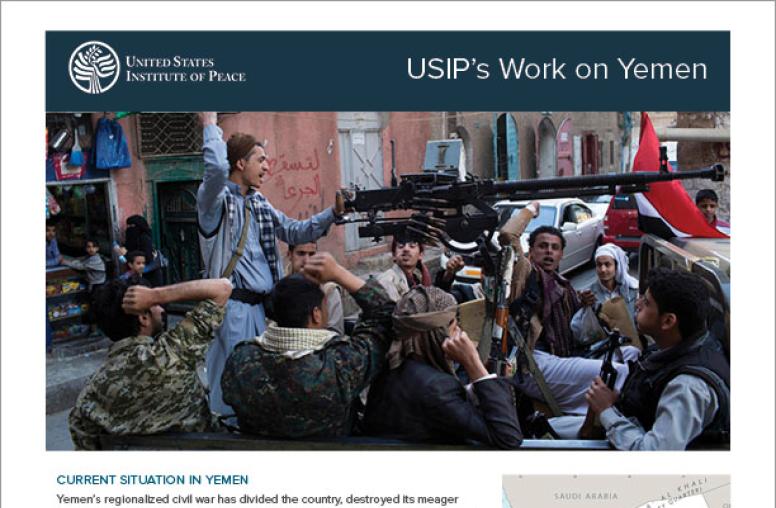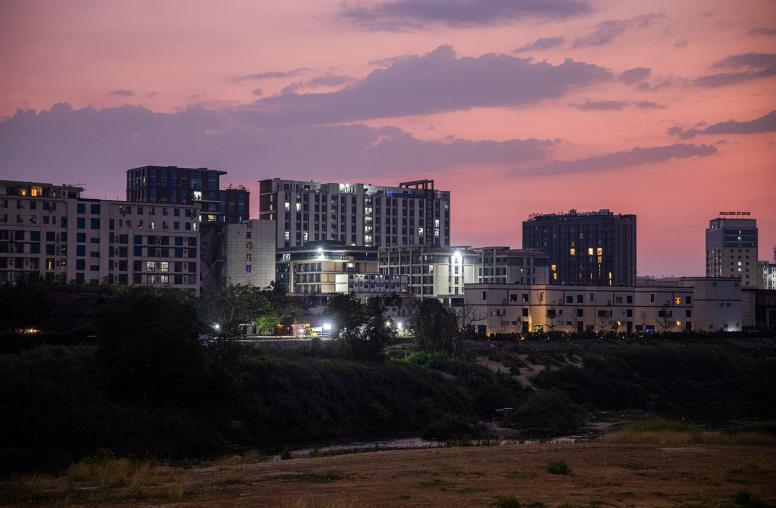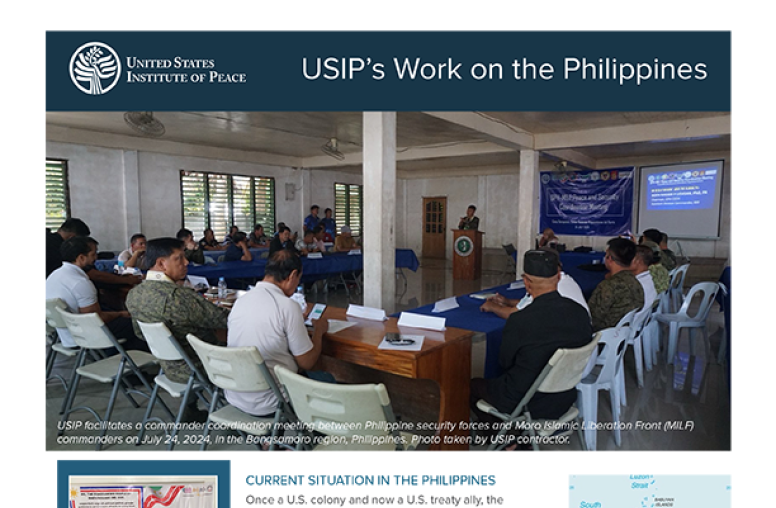Research & Analysis
U.S. Institute of Peace’s articles, reports, tools and other features provide policy analysis, research findings, and practitioner guides. These publications examine critical conflict issues at the center of the Institute’s work to prevent and resolve violent conflict.
The views expressed in these publications are those of the author(s).

Jason Tower on How China-Backed Scam Groups Threaten U.S. Interests
Transnational scams based out of Southeast Asia are increasingly targeting American citizens in a trend that is being “increasingly compared to fentanyl in terms of the impacts on the U.S.,” says USIP’s Jason Tower, adding that since the crime syndicates have close ties with China, we should be “pushing China on this issue to hold it accountable.”

The Current Situation in Yemen
Yemen’s regionalized civil war has divided the country, destroyed its meager infrastructure and created one the worst humanitarian crises in the world. From the start, it has been connected to a regional competition between Saudi Arabia (which has supported the internationally backed Yemeni government) and Iran (which has supported the Houthis). A U.N.-backed truce in 2022 brought relative calm to internal frontlines and, with help from the Sultanate of Oman and Saudi Arabia, the U.N. made progress toward a roadmap agreement to end the war. This progress was upended by the Gaza war in 2023, as the Houthis attacked Israel and international shipping through the Red Sea corridor. Houthi attacks, including on commercial shipping and U.S. naval assets, frayed international support for a peace deal that would see resources flow to the group and have set the country on different trajectory.

China Exploits Thailand’s Crackdown on Scam Compounds to Grow Security Influence
Under pressure from China, Thailand has begun its most significant crackdown to date on the transnational crime groups that dominate the Myanmar-Thailand border region. USIP’s Jason Tower explains what prompted the crackdown, how it will impact global efforts to curb transnational crime, what it says about China’s growing influence in the region, and how this all affects U.S. security interests.

Lessons for the U.S. from the Evolution of China’s Ties in Latin America
As the Trump administration looks to compete more effectively with China in Latin America, it should take stock of the various ways in which China’s relationship with the region has evolved over the past four years. China’s economic engagement with Latin America is changing in notable ways, alongside shifts in China’s economic landscape and industrial policy. China’s diplomatic outreach is also evolving as the country seeks to maintain and deepen political and economic ties to the region while pursuing a position of leadership within the Global South.

Dean Cheng on China’s Bid for Dominance in Space
As China works to establish “a space Silk Road” through space partnerships in Africa, “There is real reason to question whether Chinese behavior in space is going to be similar” to Beijing’s current disregard for international laws around issues such as maritime territorial claims and intellectual property rights, says USIP’s Dean Cheng.

Border Security Training Program (BSTP)
USIP’s Border Security Training Program (BSTP) trains police officers from Kenya’s Border Police Unit (BPU) and General Service Unit (GSU) who are serving on al-Shabaab’s major transit corridor along the Kenya-Somalia border. The program, which began in 2017, is implemented in partnership with the U.S. Department of State’s Bureau of Counterterrorism and equips Kenyan police with the skills to better understand the civilian environment and cultivate relationships in order to more effectively achieve their mission and counter terrorist activity.

The Current Situation in the Philippines
Once a U.S. colony and now a U.S. treaty ally, the Philippines sits at the heart of geopolitical contestation in East Asia. It is also home to a half-century old internal conflict that has long spawned transnational threats to global security.

Religious Engagement in Peacebuilding
With 84 percent of people worldwide identifying with a faith tradition, religion influences local, national, and international decision-making. Across the globe, violent extremism often is couched in religious terms, and religious discrimination is on the rise. At the same time, people of faith and religious organizations frequently are on the frontlines of peace efforts, assisting communities affected by violence. Although religious considerations have been marginal to peace efforts historically, governments and peacebuilding organizations increasingly recognize the importance of religion.

El Arte de un Acuerdo para Venezuela
A medida que la crisis venezolana se prolonga y se perfila otro año frustrante de esperanzas frustradas y hambre, surge la pregunta de si existe un enfoque más efectivo. El país lleva 20 años estancado mientras los regímenes de Chávez y luego de Maduro han intentado aferrarse al poder frente a una oposición que ha buscado desplazarlos, en su mayoría —aunque no siempre— por medios pacíficos.

The Art of a Deal for Venezuela
As the Venezuelan crisis grinds on into what is expected to be another frustrating year of dashed hopes and empty bellies, the question of whether there is another approach that would be more effective looms. The country has been stuck for 20 years as the Chavez and subsequent Maduro regimes struggled to hold on to power against an opposition that has sought to displace them, largely — but not always — through peaceful means.